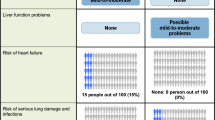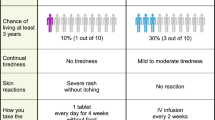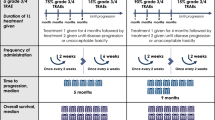Abstract
Background
There has been no single standard-of-care treatment of patients with advanced/metastatic soft tissue sarcoma (STS). This study was designed to understand patient and oncologist preferences in the advanced/metastatic setting.
Methods
Adult patients diagnosed with STS and oncologists treating patients with STS completed discrete choice experiment surveys. Study participants chose between pairs of hypothetical treatment profiles for advanced STS characterized by varying levels of overall survival (14, 20, or 26 months), progression-free survival (3, 5, or 7 months), objective tumor response rate (12, 18, or 26%), risk of hospitalization due to side effects (12, 30, or 46%), and days/month to administer treatment (1, 2, or 4 days). A hierarchical Bayes model was used to estimate preferences and relative importance of attributes.
Results
Seventy-six patients (23.7% male, mean age 52.8 years) and 160 oncologists (73.8% male, mean 16.9 years in practice) completed the surveys. Among patients, overall survival had the highest relative importance (39.5%, standard deviation [SD] 18.2%), followed by response rate (21.2%, SD 10.4%), and hospitalization (19.8%, SD 12.5%). Among oncologists, overall survival had the highest relative importance (44.6%, SD 16.0%), followed by hospitalization (18.4%, SD 8.3%).
Conclusions
Both patients with STS and oncologists preferred a treatment that maximizes the life of patients while avoiding hospitalizations.



Similar content being viewed by others
References
Zahm SH, Fraumeni JF. The epidemiology of soft tissue sarcoma. Semin Oncol. 1997;24(5):504–14.
NCCN Guidelines Version 2.2017, February 8, 2017—Soft Tissue Sarcoma.
Wagner MJ, Amodu LI, Duh MS, Korves C, Solleza F, Manson SC, et al. A retrospective chart review of drug treatment patterns and clinical outcomes among patients with metastatic or recurrent soft tissue sarcoma refractory to one of more prior chemotherapy treatments. BMC Cancer. 2015;15:175.
Skafida E, Kokkali S, Nikolaou M, Digklia A. Metastatic soft tissue sarcoma: current treatment landscape and future perspectives. Expert Rev Anticancer Ther. 2017;17(6):537–43.
Blay JY, Ray-Coquard I. Sarcoma in 2016: evolving biological understanding and treatment of sarcomas. Nat Rev Clin Oncol. 2017;14(2):78.
Frezza AM, Stacchiotti S, Gronchi A. Systemic treatment in advanced soft tissue sarcoma: what is standard, what is new. BMC Med. 2017;15(1):109.
Drugs approved for soft tissue sarcoma. Rockville: National Cancer Institute; 2015 [cited 15 Aug 2017]. Available at: https://www.cancer.gov/about-cancer/treatment/drugs/soft-tissue-sarcoma.
McQuellon RP, Muss HB, Hoffman SL, Russell G, Craven B, Yellen SB. Patient preferences for treatment of metastatic breast cancer: a study of women with early-stage breast cancer. J Clin Oncol. 1995;13(4):858–68.
Silvestri G, Pritchard R, Welch HG. Preferences for chemotherapy in patients with advanced non-small cell lung cancer. BMJ. 1998;317(7161):771–5.
Sommers BD, Beard CJ, D’Amico AV, Kaplan I, Richie JP, Zeckhauser RJ. Predictors of patient preferences and treatment choices for localized prostate cancer. Cancer. 2008;113(8):2058–67.
Mohamed AF, Gonzalez JM, Fairchild A. Patient benefit-risk tradeoffs for radioactive iodine-refractory differentiated thyroid cancer treatments. J Thyroid Res. 2015;2015:438235.
Gonzalez JM, Morlock R, Ogale S, Sommer N, Posner J, Grothey A. Patients’ and physicians’ risk-benefit trade-off preferences for metastatic colorectal cancer treatments. J Clin Oncol. 2015;33(15 Suppl):3591.
Damery S, Biswas M, Billingham L, Barton P, Al-Janabi H, Grimer R. Patient preferences for clinical follow-up after primary treatment for soft tissue sarcoma: a cross-sectional survey and discrete choice experiment. Eur J Surg Oncol. 2014;40(12):1655–61.
Thurstone LL. A law of comparative judgement. Psychol Rev. 1927;34(4):273.
McFadden D. Conditional logit analysis of qualitative choice behavior. In: Zarenmbka P, editor. Frontiers in econometrics. New York: Academic; 1989. p. 105–42.
McFadden D. The choice theory approach to market research. Mark Sci. 1986;5:275–9.
Bridges JF, Hauber AB, Marshall D, Lloyd A, Prosser LA, Regier DA, et al. Conjoint analysis applications in health—a checklist: a report of the ISPOR Good Research Practices for Conjoint Analysis Task Force. Value Health. 2011;14(4):403–13.
Tap WD, Jones RL, Van Tine BA, Chmielowski B, Elias AD, Adkins D, et al. Olaratumab and doxorubicin versus doxorubicin alone for treatment of soft-tissue sarcoma: an open-label phase 1b and randomised phase 2 trial. Lancet. 2016;388(10043):488–97.
Roth AJ. Adding new agent to chemotherapy boosts survival in small trial of soft tissue sarcoma. Cure Today, Nov 13, 2015 [cited 15 Nov 2016]. Available at: http://www.curetoday.com/articles/adding-new-agent-to-chemotherapy-boosts-survival-in-small-trial-of-soft-tissue-sarcoma.
Judson I, Verweij J, Gelderblom H, Hartmann JT, Schöffski P, Blay JY, et al. Doxorubicin alone versus intensified doxorubicin plus ifosfamide for first-line treatment of advanced or metastatic soft-tissue sarcoma: a randomised controlled phase 3 trial. Lancet Oncol. 2014;15(4):415–23.
Kuhfeld WF. Marketing research methods in SAS. Experimental Design, Choice, and Graphical Techniques; SAS 9.2 Edition. Cary, NC: SAS Institute Inc.; 2010 [cited 15 Nov 2016]. Available at: http://support.sas.com/techsup/technote/mr2010.pdf.
SawtoothSoftware.com. Orem, UT: Sawtooth Software, Inc.; 2016 [cited 15 Nov 2016]. Available at: http://www.sawtoothsoftware.com/.
Orme B. Sample size issues for conjoint analysis studies. Sequim: Sawtooth Software Technical Paper. Orem, UT: Sawtooth Software; 1998.
Johnson R, Orme B. Getting the most from CBC. Sequim: Sawtooth Software Research Paper Series. Orem, UT: Sawtooth Software; 2003.
Orme BK, Chrzan K. Becoming an expert in conjoint analysis: choice modeling for pros. Orem: Sawtooth Software; 2017.
Funding
Research funding was provided by Eli Lilly and Company to Analysis Group, Inc.
Author information
Authors and Affiliations
Contributions
All authors made significant contributions to the study design, analysis and interpretation of the data, and preparing and reviewing the manuscript. All named authors meet the International Committee of Medical Journal Editors (ICMJE) criteria for authorship for this manuscript, take responsibility for the integrity of the work as a whole, and have given final approval of the version to be published. All authors had full access to all of the data presented in this study and take complete responsibility for the integrity of the data and accuracy of the data analysis.
Corresponding author
Ethics declarations
Ethical approval
All study procedures were reviewed and approved as exempt under 45 CFR §46.101(b)(2) by the Western Institutional Review Board, Puyallup, WA, USA. Informed consent was obtained from all individual participants included in the study.
Conflict of interest
Lisa M. Hess, Yajun Zhu, and Steven Nicol are employees of Eli Lilly and Company. Jasmina Ivanova, Viviana Garcia-Horton, Sophia Graham, and Xinyue Liu are employees of Analysis Group, Inc.
Electronic supplementary material
Below is the link to the electronic supplementary material.
Rights and permissions
About this article
Cite this article
Ivanova, J., Hess, L.M., Garcia-Horton, V. et al. Patient and Oncologist Preferences for the Treatment of Adults with Advanced Soft Tissue Sarcoma: A Discrete Choice Experiment. Patient 12, 393–404 (2019). https://doi.org/10.1007/s40271-019-00355-0
Published:
Issue Date:
DOI: https://doi.org/10.1007/s40271-019-00355-0




